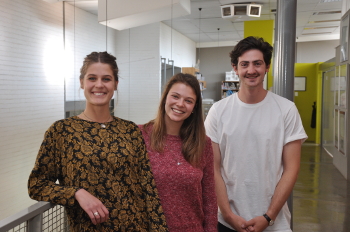Latest News Archive
Please select Category, Year, and then Month to display items
12 January 2024
|
Story Nonsindiswe Qwabe
|
Photo Sonia Small
 Since joining the UFS in 2008, Dr Grey Magaiza has worked extensively on approaches that can foster the socio-economic transformation of societies.
Since joining the UFS in 2008, Dr Grey Magaiza has worked extensively on approaches that can foster the socio-economic transformation of societies.
“The future should be one where communities can decide on their development agenda and futures. That’s the most important for me.” Dr Grey Magaiza, Deputy Director of the Centre for Gender and Africa Studies (CGAS) and Head of the Community Development programme on the Qwaqwa Campus, is passionate about capacitating communities to be agents of change and advancement. His vision for the future emphasises the empowerment of communities to take charge of their development by actively participating in decision making and the implementation of development projects that can improve their lives.
Since joining the UFS in 2008, Dr Magaiza has worked extensively on approaches that can foster the socio-economic transformation of societies. Over the years, he has crafted his research speciality into one that he is most proud of – being an interdisciplinary scientist immersed in the development of communities.
“I’m in a fortunate position of researching what I like. I say ‘fortunate’, because I’ve taken the time to understand what I’m passionate about, which is the overall field of rural livelihoods and livelihood futures – in short, community development. My research starts from an engaged university, understanding the elements that a university must use to enhance transformation and relevance to its immediate community in terms of development.”
One of the ways he has done this is by looking at social entrepreneurship as a development approach for young people in a rural setting. Through workshops with non-profit and civic organisations in Qwaqwa, Dr Magaiza has been helping these organisations to map out their needs and actively meet them through the involvement and support of external role players.
“We understand that communities are part of the national development agenda, but even that national agenda respects community knowledge and intentions and allows communities to shape their identity. A critical enabler of this is community organising. You bring back the capacity in communities to have dialogues on issues affecting them as spaces for engagement, knowledge exchange, and for people to just talk about their way forward.”
By enabling communities to define their development agenda, they can address their specific needs, challenges, and aspirations, he said. “When I look at livelihood futures, it’s quite an exciting aspect of my work – it’s like looking into a fortune tellers’ globe, because you’re not deciding for communities what they should do, but the communities themselves take those decisions.”
Department of Architecture creates environment for winners
2017-08-29

The three beneficiaries of the Carl and Emily Fuchs
Foundation’s Prestige Prize in Architecture were from
the left: Madeli Beyers (UFS), Diana Kuhn (UCT),
and Benjamin Kollenberg (Wits).
Each received a bursary of R50 000.
Photo: Supplied
A feather in the cap for the Department of Architecture at the University of the Free State was when Madeli Beyers (BArchHons), was announced as one of three recipients of the 10th Annual Carl and Emily Fuchs Foundation Prestige Prize in Architecture.
According to Jako Olivier, Programme Director of the Department of Architecture, the top graduate students of eight national Architectural Learning Sites are adjudicated on their undergraduate portfolios, their full academic record and a 24-hour En Loge project.
This year, the En Loge project was conceptualised by the department, and investigated the forgotten voices in science, and the magical realism stories of the Free State landscape and the cosmos. The project was presented at the Boyden Observatory and science education centre.
The adjudicating panel was assembled from a list of 23 practitioners and academics proposed by the SA Institute of Architects.